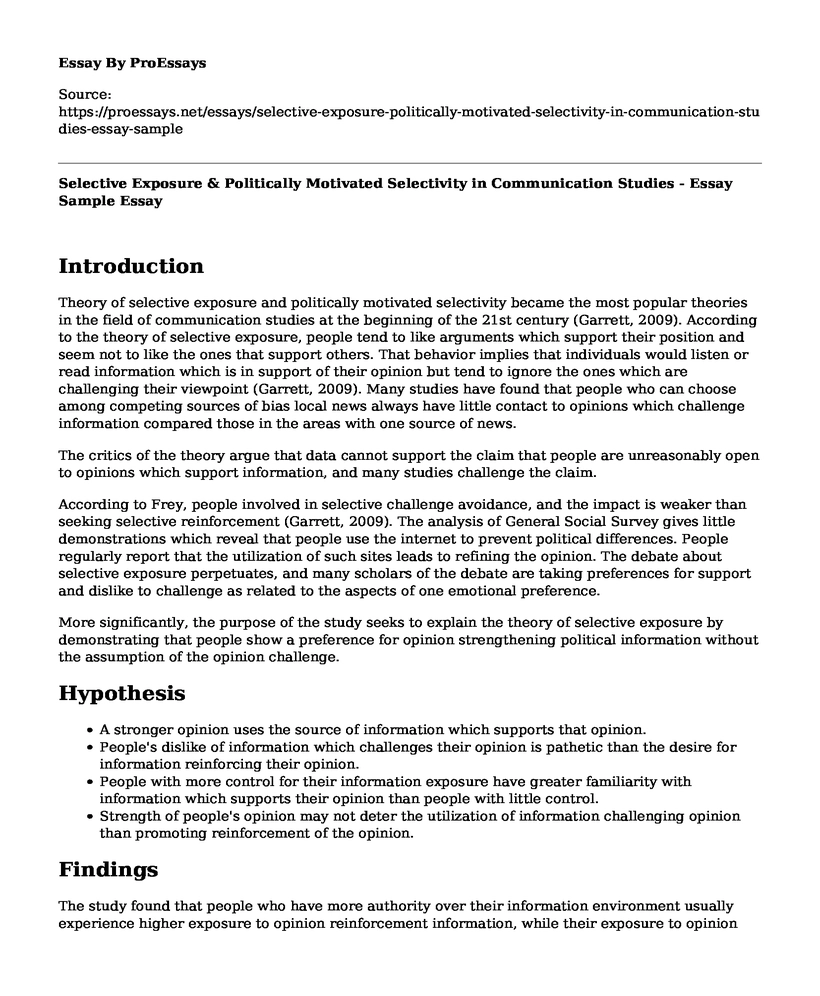Introduction
Theory of selective exposure and politically motivated selectivity became the most popular theories in the field of communication studies at the beginning of the 21st century (Garrett, 2009). According to the theory of selective exposure, people tend to like arguments which support their position and seem not to like the ones that support others. That behavior implies that individuals would listen or read information which is in support of their opinion but tend to ignore the ones which are challenging their viewpoint (Garrett, 2009). Many studies have found that people who can choose among competing sources of bias local news always have little contact to opinions which challenge information compared those in the areas with one source of news.
The critics of the theory argue that data cannot support the claim that people are unreasonably open to opinions which support information, and many studies challenge the claim.
According to Frey, people involved in selective challenge avoidance, and the impact is weaker than seeking selective reinforcement (Garrett, 2009). The analysis of General Social Survey gives little demonstrations which reveal that people use the internet to prevent political differences. People regularly report that the utilization of such sites leads to refining the opinion. The debate about selective exposure perpetuates, and many scholars of the debate are taking preferences for support and dislike to challenge as related to the aspects of one emotional preference.
More significantly, the purpose of the study seeks to explain the theory of selective exposure by demonstrating that people show a preference for opinion strengthening political information without the assumption of the opinion challenge.
Hypothesis
- A stronger opinion uses the source of information which supports that opinion.
- People's dislike of information which challenges their opinion is pathetic than the desire for information reinforcing their opinion.
- People with more control for their information exposure have greater familiarity with information which supports their opinion than people with little control.
- Strength of people's opinion may not deter the utilization of information challenging opinion than promoting reinforcement of the opinion.
Findings
The study found that people who have more authority over their information environment usually experience higher exposure to opinion reinforcement information, while their exposure to opinion challenging the information does not reduce (Garrett, 2009).
Research Ideas
The new research would be based on the assumption that the reinforcement process and challenge prevention are fundamentally related aspects of selective exposure occurrence (Garrett, 2009). More importantly, the dissimilarity is significant because the outcome of the challenge prevention is greatly destructive to democratic deliberation as compared to the reinforcement process.
The argument is that selective exposure theory is historically based on the theory of cognitive dissonance, which suggests that; attitude consistent post-decision information provokes positive feelings in the decision-making process, and attitude-inconsistent information causes disagreement. People are always motivated to reduce discord by seeking opinion-reinforcement while avoiding information challenging opinion.
World Application
World application for the findings is that Americans utilizes the control which is afforded by sources from online information to enhance their exposure on opinion corresponding to their opinions while trading off contact with other people's views (Garrett, 2009).
Reference
Garrett, R. K. (2009). Politically motivated reinforcement seeking: Reframing the selective exposure debate. Journal of communication, 59(4), 676-699.
Cite this page
Selective Exposure & Politically Motivated Selectivity in Communication Studies - Essay Sample. (2023, Feb 13). Retrieved from https://proessays.net/essays/selective-exposure-politically-motivated-selectivity-in-communication-studies-essay-sample
If you are the original author of this essay and no longer wish to have it published on the ProEssays website, please click below to request its removal:
- Advantages and Disadvantages of Making Policies that Fund Scientific Research
- The Corrupt Bargain Essay Example
- Expansionary Fiscal Policy Essay Example
- Essay Sample on Fourteenth Amendment and Homeland Security
- Essay Example on Technological Revolution Transforming Education: Impact on Society
- Research Paper on Fracturing Invasion: Threat to Democracy and Freedom
- Essay Example on American Elections







